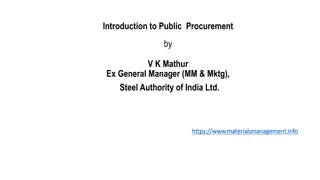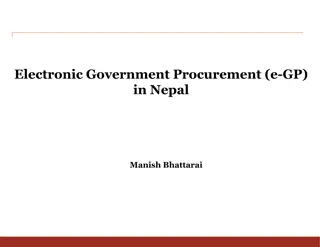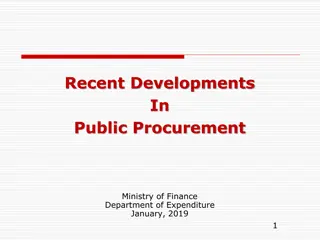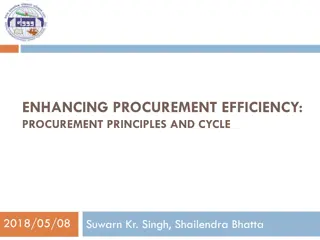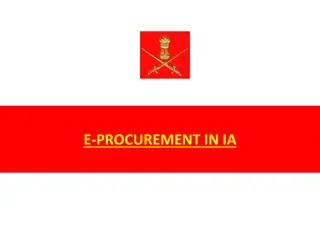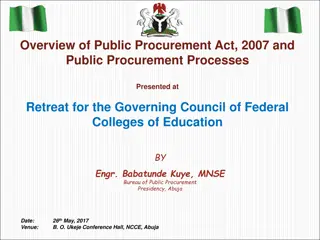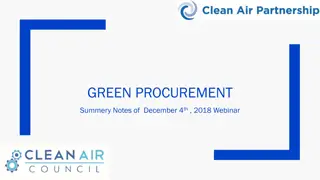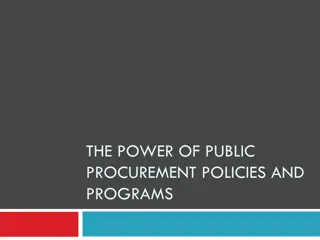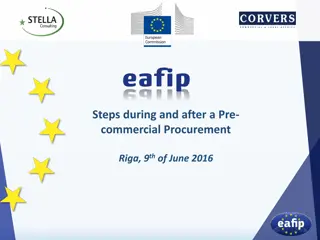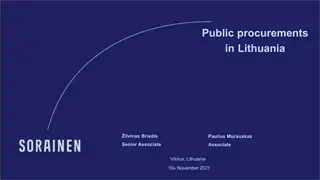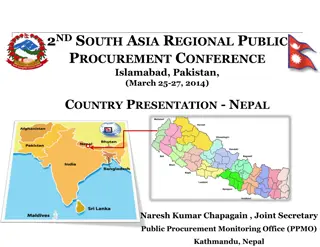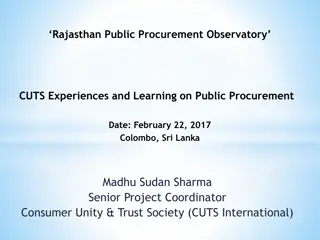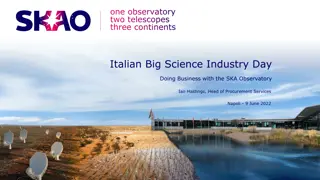Sustainable Public Procurement Initiatives in India
Sustainable Public Procurement (SPP) is a process where public organizations meet their needs in a way that generates benefits for society and the environment. This approach aligns with international obligations such as SDG 12.7 to promote sustainable procurement practices. The Indian government has taken initiatives to integrate SPP principles into its procurement rules and processes, emphasizing responsibility towards the environment, social sustainability, and value for money.
Download Presentation

Please find below an Image/Link to download the presentation.
The content on the website is provided AS IS for your information and personal use only. It may not be sold, licensed, or shared on other websites without obtaining consent from the author.If you encounter any issues during the download, it is possible that the publisher has removed the file from their server.
You are allowed to download the files provided on this website for personal or commercial use, subject to the condition that they are used lawfully. All files are the property of their respective owners.
The content on the website is provided AS IS for your information and personal use only. It may not be sold, licensed, or shared on other websites without obtaining consent from the author.
E N D
Presentation Transcript
Sustainable Public Procurement Ministry of Finance Department of Expenditure Government of India July, 2019 1
Definition- SPP Process whereby public organizations meet their needs for goods, services, works and utilities in a way that achieves value for money on a whole life-cycle basis in terms of generating benefits not only to the organization, but also to society and the significantly reducing impacts on the environment. (UNEP SPP Review 2017) economy, whilst negative 2
Why SPP? Responsibility towards Environment; Social Sustainability; Responsibility towards weaker sections of society; Responsibility Money by achieving Value for Money (VfM) through the Costing (LCC) towards Tax Payer s use of Life Cycle 3
International Obligations SDG 12.7 pertains to SPP Promote public procurement practices that are sustainable in accordance with national policies and priorities Indicator internationally established methodology or standards are approved) 12.7.1 (Tier III: No Number sustainable public procurement policies and action plans of countries implementing 4
Initiatives so far In India 5
Provisions in existing Rules General Financial Rules (GFR), 2017 Rule 173 (xi) (b): Criteria for determining responsiveness are to be taken into account for evaluating performance/efficiency/environmental characteristics; Rule 136 (iii): No work shall be commenced or liability incurred in connection with it until- a properly detailed sanctioned; while designing the projects etc, principles of Life Cycle cost may also be considered; the bids such as- design has been 6
GFR Star Rating Certification Rule 173 Ministries/ electrical threshold or higher Star Rating of BEE; Depicts that purchase is done on the basis of Value for Money and not on the basis of L-1 (xvii) Departments appliances of GFR, 2017 while ensure states procuring notified that shall
Enabling provisions in Procurement Manual of MoF Star Rating Certification Thresholds Para 2.2.1 of Manual for Procurement of Goods, 2017 Appliance Threshold Star Rating 5 Star (under normal conditions where annual usages are expected to be more than 1000 Hrs) 3 Star (where usage of AC is limited e.g. in conference rooms) 4 Star 5 Star 5 Star Split Air conditioners Frost Free Refrigerators Ceiling Fans Water Heaters 8
EESL Model Energy Scheme http://www.ujala.gov.in Efficiency Services Limited (EESL): UJALA Government of India initiative for domestic lighting and appliances; 350 Million LED Bulbs distributed across India; Cost Savings of Rs. 18,224 crores (USD 2.60 Billion); Development of market for Sustainable products and hence reduction of rates; As of 31st May, 2019, reduction 37 Million tonne CO2
Social Sustainability Rule 153 (ii) of GFR, 2017 refers to the Micro, Small & (MSMEs) Procurement policy, 2012 358 reserved items; 25% procurement through MSE if they quote within L1+15% and match price of L1 Medium Enterprises 10
Social Sustainability Startups: Rule 173 (i) of GFR 2017, Para 5.1.4(g) of Manual for Procurement of Goods, 2017 and para 1.9.1 (ix) of Services Manual, 2017 The condition of prior turn over and prior experience may be relaxed for Start-ups, subject to meeting of quality & technical specifications and making suitable provisions in the bidding documents
LCC Example Delhi used LCC approach in award of their contract worth USD 597 Million Between the winning lowest, there was a difference of USD 92.4 Million. Metro Rail Corporation (DMRC) bidder and What safeguards should be taken to secure this difference? Additional BG? Vitiation of process?
Eco-Mark Status Eco-Mark scheme was instituted in 1991 by MoEFCC for procurement of environmental friendly products; Eco-Mark certification is given by BIS and is an addition to the ISI Certification. At present there are 52 eco- mark licenses; Lack of interest from market/ Govt. Procurement Policies; 13
Sustainable Procurement Task Force (SPTF) In March, 2018 a Sustainable Procurement Task Force (SPTF) was constituted with following Terms of Reference Review International Best Practices in the area of SPP; Inventorise the current status of SPP in India across Government organizations; Prepare a draft Sustainable Procurement Action Plan; Recommend initial set of product/ service categories (along with their specifications) where SPP can be implemented Identification of few items where SPP can be started is the focus area of the Task Force 14
Ongoing.. Product Prioritization Study A prioritization exercise funded by UNEP is being conducted Through this study, sustainable product groups/ items shall be identified and prioritised; To suggest corresponding procurement criteria for the top three ranking product groups; To organize consultations with stake- holders sustainable
Thank you !! 16
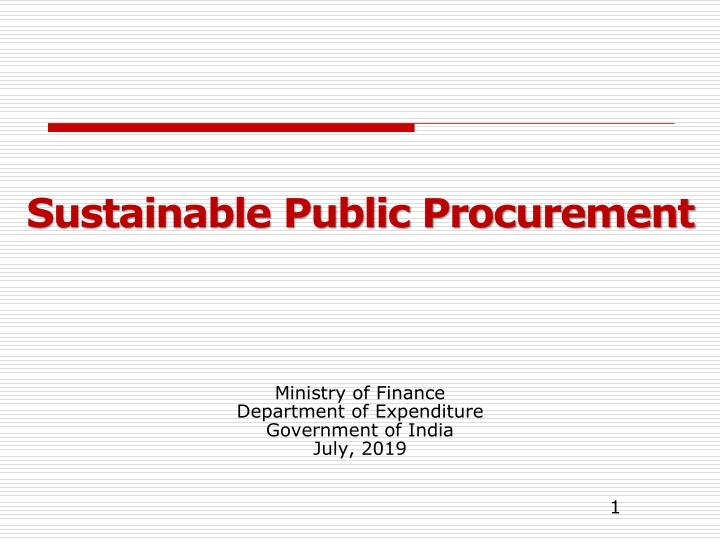



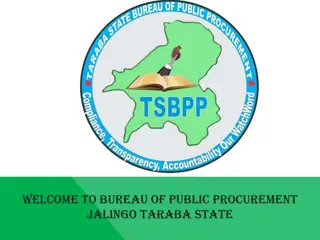
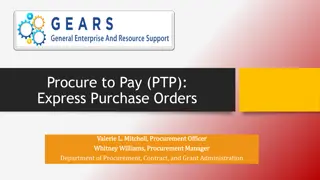
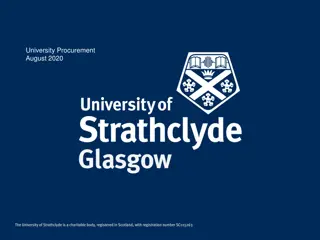
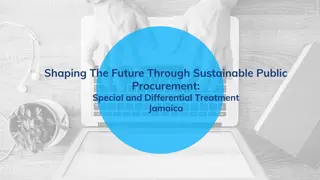
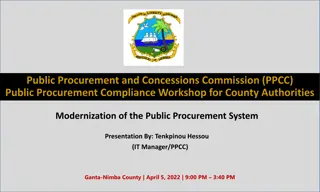
![Comprehensive Overview of Corruption Watch Submission on Public Procurement Bill [B18B-2023]](/thumb/138344/comprehensive-overview-of-corruption-watch-submission-on-public-procurement-bill-b18b-2023.jpg)
